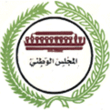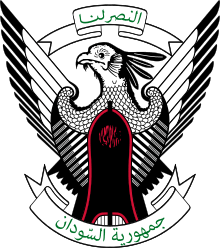National Assembly of Sudan
The National Assembly (Arabic: المجلس الوطني السوداني, Al-Maǧlis al-Waṭaniy) is the lower house of the National Legislature of Sudan. The Legislature was unicameral until 2005. The upper house is the Council of States (Majlis Welayat).
The National Assembly of the Republic of Sudan المجلس الوطني السوداني | |
|---|---|
| 5th National Assembly | |
 | |
| Type | |
| Type | Lower House of the National Legislature of Sudan |
| History | |
| Founded | 1948 |
| Disbanded | 2019 (suspended) |
| Seats | 426 |
| Elections | |
| Mixed member majoritarian (First past the post for 213 seats, proportional representation for 213 seats, 128 of which are reserved for women) | |
Last election | 13–16 April 2015 |
| Website | |
| The National Assembly | |
 |
|---|
| This article is part of a series on the politics and government of Sudan |
|
|
|
|
Judiciary
|
|
Administrative divisions |
|
|
Related topics
|
The National Assembly was dissolved on 11 April 2019 following a military coup which overthrew Sudan President Omar al-Bashir and Assembly's ruling National Congress Party.[1]
As part of the 2019 Sudanese transition to democracy, a Transitional Legislative Council is to be formed which will function as the legislature of Sudan until elections scheduled for 2022. [2]
Speakers
Hassan Abdallah al-Turabi was the speaker from 1996 until he stripped of the post in December 1999, and placed under arrest after a falling out with President Omar al-Bashir.
| Position | Name | Took office | Left office | Notes |
|---|---|---|---|---|
| President of the Assembly | Muhammad Salih Shingitti | 1948 | 1953 | [3] |
| Speaker of the upper house, Senate | Ahmed Mohamed Yassin | 1954 | 1956 | [4] |
| Speaker of the upper house, Senate | Mohammed El Hassan Diab | 1956 | 1957 | [5] |
| Speaker of the lower house, House of Representatives | Babiker Awadalla | 1954 | 1957 | [3] |
| Speaker of the lower house, House of Representatives | Muhammad Salih Shingitti | 1957 | November 1958 | [3][6] |
| Speaker of the upper house, Senate | Amin al-Sayed | 1957 | November 1958 | [3][6] |
| President of Central Council | Awad Abdel Rahman Sghir | 1962 | 1964 | [3] |
| Chairman, first constituent assembly | Mubarak Fadel Shaddad | 1965 | 1965 | [3] |
| Chairman, second constituent assembly | Mubarak Fadel Shaddad | 1968 | 1969 | [3] |
| Chairman, people's assembly | Alnadhir Dafeallah | 1972 | 1973 | [3] |
| Chairman, people's assembly | Rashid Bakr | 1974 | 1976 | [3][7] |
| Chairman, people's assembly | Abu al-Qasim Hashim | 1976 | 1980 | [3] |
| Chairman, people's assembly | Rashid Bakr | 1980 | 1981 | [3][7] |
| Chairman, fifth people's assembly | Izz al-Din al-Sayed Mohammed | 1982 | 1985 | [3] |
| Chairman, constituent assembly | Mohamed Ibrahim Khalil | 1986 | 1988 | [3][6] |
| Chairman, constituent assembly | Mohamed Yousef Mohamed | 1988 | 1989 | [3][6] |
| Chairman, constituent assembly | Farouk Ali Al-Barir | 12 April 1989 | 30 June 1989 | [3][6] |
| Chairman, National Transitional Council | Mohamed Al-Amin Khalifa | 1992 | 1996 | [3] |
| Speaker, National Assembly | Hassan Al-Turabi | 1996 | December 1999 | [3][8] |
| Dissolved | December 1999 | December 2000 | [9] | |
| Speaker, National Assembly | Ahmed Ibrahim al-Tahir | 2001 | 31 August 2005 | [3][10][11] |
| Speaker, National Assembly | Ahmed Ibrahim al-Tahir | 31 August 2005 | November 2013 | [12] |
| Speaker, National Assembly | Fatih Ezzedine al-Mansur | November 2013 | 1 June 2015 | [13][14] |
| Speaker, National Assembly | Ibrahim Ahmed Omer Ahmed | 1 June 2015 | 11 April 2019 | [15] |
2015-2019 session
The most recent session was elected in 2015.
| Party | Votes | % | Seats | +/– | |
|---|---|---|---|---|---|
| National Congress | 4,321,901 | 83.4 | 323 | ||
| Democratic Unionist Party | 249,768 | 4.8 | 25 | ||
| Democratic Unionist Party (Jalal al-Digair) | 137,265 | 2.6 | 15 | ||
| Other parties | 475,185 | 9.2 | 44 | ||
| Independents | 19 | ||||
| Invalid/blank votes | – | – | – | ||
| Total | 5,184,119 | 100 | 426 | – | |
| Registered voters/turnout | – | – | |||
| Source: Adam Carr Sudan News Agency | |||||
2010-2015 session
Sudan was previously in a transitional period following the signing of a Comprehensive Peace Agreement (CPA) on 9 January 2005 that officially ended the civil war between the Sudanese Government (based in Khartoum) and the southern-based Sudan People's Liberation Movement (SPLM) rebel group. The National Assembly consisted of 450 appointed members who represent the government, former rebels, and other opposition political parties. The National Assembly, whose members were appointed in mid-2005 replaced the latest elected parliament. All members of the National Legislature serve six-year terms. Article 117 of the Interim Constitution called for the 450 members of the National Assembly to be appointed according to the following power-sharing formula:[16]
National Congress Party (52%)
- 49% to northerners
Other Arab political parties (14%)
- Umma Party (Hizb al-Umma)
- Democratic Unionist Party
- Sudanese Communist Party
- Sudanese Ba'ath Party
Sudan People’s Liberation Movement (28%)
- 28% to southerners
Other Black political parties (6%)
- United Democratic Sudan Forum
- Union of Sudan African Parties 1
- Union of Sudan African Parties 2
- United Democratic Front
- South Sudan Democratic Forum/ Democratic Forum for South Sudan
- Sudan African National Union
Composition of the National Assembly following the 2010 election[17] and the independence of South Sudan.[18]
| Party | 2010 Election Results | Following independence of South Sudan | |
|---|---|---|---|
| National Congress Party (NCP) | 323 | 316 | |
| Sudan People's Liberation Movement (SPLM) | 99 | 8 | |
| People's Congress Party | 4 | 4 | |
| Democratic Unionist Party (DUP) | 4 | 4 | |
| Federal Umma Party | 9 | 3 | |
| Umma Party for Reform and Development | 2 | 2 | |
| Democratic Unionist Party - Origin | 2 | 0 | |
| Sudan People's Liberation Movement - Democratic Change | 2 | 0 | |
| Umma Collective Leadership | 1 | 1 | |
| National Umma Party | 1 | 1 | |
| Umma Party | 1 | 1 | |
| Muslim Brotherhood | 1 | 1 | |
| Independents | 3 | 3 | |
| Vacant | 4 | 8 | |
| Total | 450 | 354 | |
References
- "Sudan military declares state of emergency". edition.cnn.com. 11 April 2019.
- http://raisethevoices.org/wp-content/uploads/2019/08/sudan-amendment.pdf
- "تاريخ المجلس الوطنى". parliament.gov.sd. Archived from the original on 2019-05-04. Retrieved 2019-02-28.
- "جمهورية السودان - المجلس الوطنى". www.parliament.gov.sd. Archived from the original on 2019-05-04. Retrieved 2019-03-01.
- "جمهورية السودان - المجلس الوطنى". www.parliament.gov.sd. Archived from the original on 2019-05-04. Retrieved 2019-03-01.
- "جمهورية السودان - المجلس الوطنى". www.parliament.gov.sd.
- "جمهورية السودان - المجلس الوطنى". www.parliament.gov.sd. Archived from the original on 2019-05-04. Retrieved 2019-03-01.
- "Parlements". Inter-parliamentary Union. 29 April 1999 – via Google Books.
- "SUDAN: parliamentary elections Majlis Watani, 2000". archive.ipu.org.
- "The Sudan National Assembly". parliament.gov.sd.
- "Speaker of National Assembly Hails Sudanese Pioneers who Achieved Independence". sudaneseonline.com.
- https://unmis.unmissions.org/sites/default/files/CPA%20Monitor%20July%202010.pdf
- "The Sudan National Assembly". parliament.gov.sd.
- https://allafrica.com/stories/201312160213.html
- "The Sudan National Assembly". parliament.gov.sd.
- "Neues Parlament für Kryptowährungen".
- "IPU PARLINE database: SUDAN (Majlis Watani), Last elections". archive.ipu.org.
- "The Present National Assembly:". www.parliament.gov.sd.